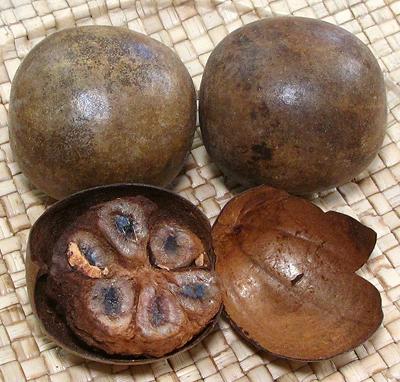 [Luo han guo (China); La han qua (Viet); longevity fruit (not unique);
Fructus Momordicae (Pharm); Siraitia grosvenorii]
[Luo han guo (China); La han qua (Viet); longevity fruit (not unique);
Fructus Momordicae (Pharm); Siraitia grosvenorii]
Native to southern China and northern Thailand, this gourd is related to the Bitter Gourds, but genus Siraitia, not Momordica). This fruit has recently become much better known in the West. Extracts from this fruit are 300 times sweeter than cane sugar, with almost no calories. The US FDA (Food and Drug Administration) has recently rated the fruit and extracts from it as GRAS (Generally Regarded As Safe), so they can be included as natural sweeteners in any number of products. This sweetener has not yet been shown to have the serious negative effects of artificial sweeteners, but sufficient studies looking for those have yet to be conducted.
The fruits grow on vines, and are between 2 to 2-3/4 inches diameter with sweet, fleshy edible pulp and many seeds. Monk Fruit is a rather finicky grower, rarely found in the wild, but techniques for cultivation have been well developed in a few places in southern China. This fruit has long been used medicinally to treat heatstroke, throat infections and diabetes, but is not mentioned in traditional Chinese medicine because it doesn't grow near central China. It is not used fresh as it doesn't keep well and has objectional aromas and flavors. It is generally oven dried, after which it has different objectional tastes and aromas. Modern processing techniques are capable of removing these. After drying, the shell is very hard, but also very thin and brittle, while the pulp becomes soft and powdery.
More on Gourds